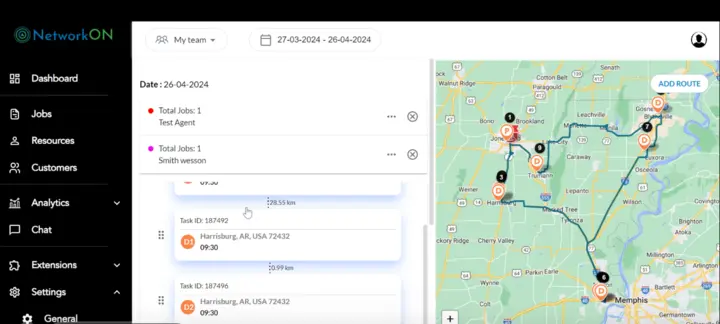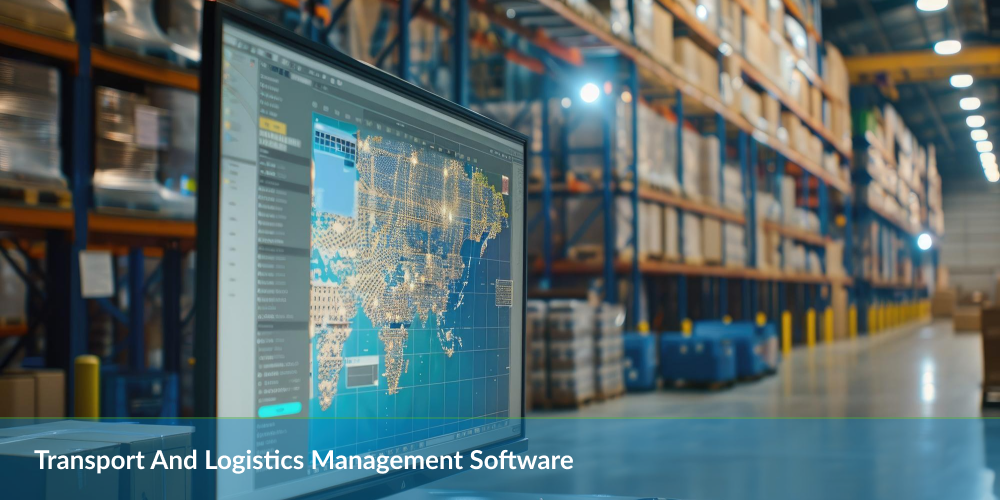Table of Contents
In transport and logistics, management software serves as the digital backbone, streamlining complex operations precisely. This software, often referred to as Transport and Logistics Management Software, orchestrates the movement of goods from origin to destination, optimizing each step for efficiency and reliability.
As the epicenter of logistics planning, execution, and performance measurement, these solutions extend beyond mere tracking; they harmonize the flow of information, automate routine tasks, and facilitate strategic decision-making. Integrating various functions, such as inventory management, route planning, and real-time tracking, enables businesses to achieve greater operational efficiency, reduce costs, and enhance customer satisfaction.

The core features of transport and logistics management software, ranging from inventory control to order management, routing, and scheduling, are designed to deliver a seamless operational symphony. Enhanced with real-time visibility and analytics, this software enables companies to pivot with agility, ensuring that the ever-changing demands of commerce are met with unwavering service excellence.
With such software, businesses can expect to keep pace and outstrip the competition as they deliver unparalleled service to their clients. Interactions transform as accuracy in deliveries and reductions in delays become the standard, reinforcing the promise of excellence in every shipment.
Top Transport and Logistics Management Software
Discover the leading transport and logistics management software that streamlines operations, enhances efficiency, and drives business growth.
NetworkON
NetworkON is a comprehensive logistics management platform that streamlines and optimizes supply chain operations. It focuses on enhancing visibility, improving efficiency, and facilitating seamless integration across various logistics functions.
Features:
- Real-Time Tracking: Offers live tracking of shipments and assets, allowing users to monitor and manage their logistics operations in real time.
- Advanced Analytics: Provides in-depth analytics and reporting tools to help businesses gain insights into their supply chain performance and make data-driven decisions.
- Risk Management: Includes tools for identifying and mitigating risks in the supply chain, such as potential disruptions or vulnerabilities.
- Integration Capabilities: Easily integrates with other enterprise systems and third-party applications, ensuring smooth data flow and operational consistency.
- Automated Alerts: Sends automated notifications for critical events, such as delays or issues, allowing users to take prompt action.
Descartes Systems Group
Descartes Systems Group offers a suite of logistics and supply chain management solutions designed to improve operational efficiency, compliance, and connectivity. Their platform is known for its strong focus on compliance and customs management.
Features:
- Customs and Compliance Management: Ensures adherence to global trade regulations and customs requirements with automated compliance checks and documentation.
- Routing and Optimization: Provides advanced routing algorithms to optimize transportation routes, reducing costs and improving delivery times.
- Electronic Data Interchange (EDI): Facilitates seamless data exchange between trading partners and systems through EDI integration.
- Freight Audit and Payment: Automates the freight audit and payment processes, improving accuracy and reducing administrative overhead.
- Supply Chain Visibility: Delivers end-to-end visibility across the supply chain, helping businesses track shipments and manage exceptions effectively.
Oracle Transportation Management (OTM)
Oracle Transportation Management (OTM) is a robust software solution that offers end-to-end transportation management capabilities. It enhances transportation planning, execution, and optimization for global supply chains.
Features:
- Transportation Planning and Optimization: Utilizes advanced algorithms to plan and optimize transportation routes, modes, and carriers for cost efficiency and service level improvement.
- Carrier Management: Manages carrier relationships, including rate negotiations, performance monitoring, and contract management.
- Shipment Execution: Automates the shipment execution process, including booking, tracking, and documentation, to ensure timely and accurate deliveries.
- Analytics and Reporting: Provides comprehensive reporting and analytics tools to monitor transportation performance and identify areas for improvement.
- Integration with ERP Systems: Seamlessly integrates with Oracle ERP and other enterprise systems for unified data management and operational efficiency.
Kuebix
Kuebix is a cloud-based transportation management system (TMS) known for its user-friendly interface and flexibility. It offers a range of features designed to streamline logistics operations and improve supply chain visibility.
Features:
- Freight Rate Comparison: Allows users to compare freight rates from multiple carriers to find the best shipment pricing options.
- Load Building and Optimization: Provides tools for load building and optimization to maximize space utilization and reduce transportation costs.
- Carrier Connectivity: Connects with a wide network of carriers, enabling users to manage shipments and track deliveries across various modes of transport.
- Order Management: Integrates with order management systems to streamline the process from order creation to shipment and delivery.
- Dashboard and Analytics: Features an intuitive dashboard with real-time analytics and performance metrics to track and manage logistics operations effectively.
NetSuite
NetSuite offers an integrated cloud-based ERP solution with a robust transportation and logistics management module. It is designed to support complex logistics operations and provide a unified view of the supply chain.
Features:
- Integrated Supply Chain Management: Provides comprehensive supply chain management capabilities, including inventory, order, and procurement management.
- Transportation Management: Includes tools for managing transportation processes, such as planning, execution, and monitoring, within the broader ERP framework.
- Real-Time Visibility: Offers real-time visibility into inventory levels, order status, and transportation activities for improved decision-making.
- Advanced Reporting: Features advanced reporting and analytics tools to generate insights and track key performance indicators across logistics operations.
- Seamless Integration: Integrates with other NetSuite modules and external systems, providing a cohesive solution for managing end-to-end business processes.
Boost Growth and Efficiency with Transport & Logistics Management Software
Transport and logistics management software revolutionizes supply chain operations, conferring significant strategic advantages to businesses that harness it. With technological advancements, these tools are no longer just about tracking and managing; they are strategic assets that empower companies to outperform competitors.
Streamlining Operations for Business Growth
The deployment of specialized software leads to the consolidation of various logistics processes. Companies experience fewer delays, reduced errors, and enhanced productivity, propelling growth across all levels of operation.
Data-driven Decision-Making with Real-time Information
Access to real-time data transforms how decisions are made within the logistics landscape. Managers with insights from live data enact measures that align perfectly with current marketplace demands and operational conditions.
Enhancing Customer Satisfaction through Better Delivery Services
- Providing customers with faster deliveries due to efficient route planning.
- Improving the accuracy of delivery estimates, thereby reinforcing trust.
- Offering transparency with end-to-end shipment tracking capabilities.
The correlation between the utilization of logistics software and customer satisfaction is indisputable. Enhanced delivery services foster a positive brand image and encourage customer loyalty.
Enhance Operational Efficiency with Shipping and Delivery Tracking Integration
Seamless integration with shipping and delivery tracking systems transforms logistics management. The result is a dynamic environment where real-time tracking empowers shippers and companies. This immediacy provides a lens into the logistical journey, unveiling the precise location of shipments at any given moment. Such visibility fosters proactive management, allowing swift response to any issues that may arise during transit.
Real-time tracking for shippers and companies
Access to instant tracking data equips shippers with the capacity to anticipate and communicate arrival times accurately. Companies leveraging this information can update customers, manage their expectations, and streamline their operations to align with the live logistical timeline. This capability forges a stronger link between the initial dispatch and final delivery, enabling logistical teams to synchronize activities with the movement of goods.
Improving the transparency of the shipping process
Incorporating tracking systems into logistics management software fortifies the transparency of the shipping process. Stakeholders throughout the supply chain gain a window to monitor the journey of goods, enhancing trust and accountability. Such openness dissolves the uncertainty that once shrouded shipping processes, offering clarity to customers and businesses.
Reducing errors and delays in delivery
Integration with shipping and delivery tracking reduces the margin for error and mitigates delivery delays. Automated updates and notifications reduce the reliance on manual input, diminishing the incidence of human error. Timely data on transportation conditions and logistical challenges guide corrective actions, helping to maintain the fidelity of delivery schedules.
- Logistics management software with tracking integration meticulously records each stage of the shipping process, constructing a detailed history that can be analyzed to optimize future operations.
- Real-time data helps identify patterns and bottlenecks, providing the insights needed to enhance delivery protocols and transport methods.
- A robust tracking system not only reimagines the efficacy of logistics operations but also evolves the customer experience. Updated with the whereabouts of their orders, customers enjoy an elevated sense of assurance, culminating in a stronger sense of brand loyalty and satisfaction. Companies harness these features to carve a competitive edge, fostering operational excellence and heightened customer service.
Pro Tip: Integrate real-time shipping and delivery tracking to enhance visibility, reduce errors, and improve operational efficiency and customer satisfaction.
Revolutionizing Inventory and Warehouse Management with Innovative Software Tools
Transport and logistics management software streamlines inventory control, overhauling traditional methods with precision. The software’s design facilitates the real-time tracking of goods, automating stock replenishment and reducing manual errors. This ensures that inventory levels reflect current conditions, enabling businesses to respond quickly.
Enhancing Inventory Management through Advanced Features
Deploying the advanced features of a dedicated software solution enables companies to achieve unparalleled oversight of their inventory. With capabilities such as barcode scanning, item tracking, and demand forecasting, these tools simplify complex inventories. Such features support better decision-making and elevate operational standards.
Increasing Efficiency with Warehouse Automation
Warehouse automation, propelled by sophisticated software, transforms logistics operations. Software orchestrates the integration of automated guided vehicles, robots, and conveyor belts, elevating warehouse productivity. As tasks like stocking and picking become automated, human error decreases, and throughput increases.
Accurate Stock Levels: A Cornerstone of Logistics Excellence
Maintaining precise stock levels directly impacts customer satisfaction and cost control. Software systems provide real-time data, ensuring stock levels adjust dynamically to consumer demand and supply chain fluctuations. This approach minimizes overstocking and stockouts, optimizing storage space and financial resources.
Mastering Route Optimization with Advanced Software
Transport and logistics management software stands as a beacon of operational excellence, driving unparalleled efficiencies in route planning. By pinpointing the most efficient paths, businesses witness substantial reductions in fuel consumption and accelerated delivery schedules.

Integrating transport and logistics management software is not simply about avoiding traffic jams; companies harness its power to proactively navigate an ever-changing landscape of roadways and transportation conditions.
Decreasing Fuel Costs and Delivery Times With Optimized Routing
Logistics managers know that fuel costs can cause substantial operational expenses. Software that specializes in route optimization inherently diminishes these costs. It calculates not only the shortest but also the most fuel-efficient routes. Simultaneously, delivery times improve as drivers take the most direct and least congested paths to their destinations. The net effect is a fleet moving more goods in less time while conserving fuel, positively affecting the bottom line and reducing the environmental footprint.
Adapting to Real-Time Traffic and Obstacles
Modern route planning software integrates live traffic data, adjusting routes as conditions change. When a road closure or traffic delay arises, the software dynamically re-routes vehicles to maintain steady delivery progress. Drivers remain informed of the best available routes, ensuring they can adapt quickly to new developments. This adaptability underpins a resilient distribution network prepared to tackle unforeseen challenges head-on.
Fleet Management Enhanced by Technology
Revolutionary advancements have transformed fleet management. Diverse technologies converge, allowing businesses to track fleet health and performance meticulously. Real-time vehicle diagnostics provide continuous monitoring, identifying potential issues before they escalate into costly downtime.
Fuel constitutes a major operational cost. Advanced software assists in crafting sustainability strategies by analyzing driving patterns, optimizing routes, and recommending fuel-efficient practices. Over time, these measures culminate in significant fuel consumption and carbon emissions reductions. Furthermore, such technology aids companies in adapting to a future where environmental concerns are paramount.
Regulatory compliance presents a complex challenge in the transport sector. Technology simplifies adherence to these standards, automating the collection of necessary information and ensuring timely reporting. By integrating software designed to monitor and manage compliance requirements, businesses circumvent potential legal penalties and maintain their reputations.
- Comprehensive health monitoring of vehicles improves longevity and safety.
- Precision in fuel management contributes to a more sustainable footprint.
- Keeping up-to-date with regulations is streamlined, reducing legal risks.
Utilizing Big Data Analytics and AI in Transport Planning
Transport and logistics management software evolves rapidly with the advent of big data analytics and artificial intelligence (AI). The synergy of these technologies transforms the landscape of transport planning, rendering traditional methodologies obsolete. Leveraging big data allows companies to predict trends, optimize routes, and improve overall efficiency with unprecedented accuracy.
Harnessing the power of data for predictive analytics
Integrating big data in transport systems provides an immense dataset from which actionable insights are derived. Predictive analytics outcomes steer operational decision-making, from forecasting demand to preempting maintenance issues. Accurate demand forecasting averts unnecessary expenses and maximizes resource allocation, while predictive maintenance keeps fleets operational and reduces downtime.
Artificial Intelligence’s role in dynamic transport planning and carrier management
Artificial intelligence streamlines transport planning by managing vast data with speed and precision. AI algorithms continuously assess multiple variables, instantly adjusting carrier schedules and load consolidation strategies. Notably, AI’s aptitude for learning and adaptation signifies continuous improvement in transport efficiency and capacity utilization.
Customization options for AI-driven insights
Transport and logistics management software equipped with AI tools offers customization options that cater to businesses specific needs. AI-driven insights enable companies to tailor their strategies to dynamic factors such as market demands, weather conditions, and traffic data. Custom AI solutions yield improved supply chain resilience and customer satisfaction by providing tailored logistics responses.
- Employers reduce overhead by optimally matching supply with demand.
- Transport planners capitalize on AI customization to pinpoint ideal transport conditions.
- AI evolves with the business, offering scalable analytical capabilities.
Deploying AI and big data analytics in transport planning elevates the performance of logistics systems. These technological advancements offer businesses opportunities to thrive in an increasingly complex and fast-paced marketplace. The judicious application of AI in logistics will dictate industry standards and define market leaders in the future.
Pro Tip: Leverage AI and big data analytics to enhance route optimization, demand forecasting, and carrier management for superior transport efficiency and cost savings.
Revolutionizing Logistics with Cloud Computing and the Internet of Things (IoT)
Cloud-based logistics solutions provide access to scalable, on-demand transportation management systems (TMS). These platforms allow businesses to quickly adapt to changing market demands, offering flexibility and collaboration across various distribution networks. Integration with cloud technology ensures that logistics companies can reduce IT infrastructure costs, streamline operations, and increase data accessibility.
Implementing IoT and telematics advances service capabilities as logistics operations become more complex. These technologies facilitate enhanced monitoring of assets, predictive maintenance, and delivery route optimization. Logistics managers gain immediate insight into vehicle performance, shipment conditions, and delivery progress through real-time tracking and telematics. This connectivity enables more precise decision-making and proactive management of logistics tasks.
Adopting cloud-based systems directly results in customizing software solutions to fit unique business models. These platforms are inherently flexible, allowing customization to suit the specific needs of different logistics operations. The deployment of tailored software harnesses the combined power of cloud computing and IoT to drive efficiency, improve data analytics, and bolster the overall reliability of supply chain management.
Prioritizing Customer Relationship Management (CRM) Within Logistics Software
Transportation and logistics are no longer just about moving goods from point A to B. These days, the dynamism of customer expectations has brought Customer Relationship Management (CRM) to the forefront of logistics software. Why? CRM systems streamline the tracking of customer interactions and feedback. Such tools offer a window into the customer’s experiences, preferences, and concerns, leading to more tailored services and an enhanced overall customer experience.
Logistics companies leverage CRM tools to provide dedicated customer support. These tools facilitate the creation of a personalized approach for each customer, increasing satisfaction levels. Consequently, satisfied customers are more likely to engage in repeat business, cementing a company’s reputation for service excellence. A robust CRM initiative within the logistics software illuminates the path toward improved customer loyalty and retention.
With the advent of complex supply chains, the influence of solid CRM practices on repeat business and reputation management has never been more apparent. Customers who experience proactive service, timely resolutions to their issues, and personalized communication are more inclined to become repeat customers. The presence of such customers acts as a testament to the logistics firm’s capabilities, fortifying its standing in the market. This, in turn, attracts new clients through positive word-of-mouth and robust, customer-validated reviews.
- Analytics gleaned from CRM systems can drive strategic decisions, avoiding missteps in customer service procedures.
- Tools within CRM enable the tracking and management of buyer-seller relationships, refining the sales process and forecasting with precision.
- Direct communication channels managed by CRM systems help resolve queries and issues rapidly, enhancing the logistics provider’s perceived value.
At the crossroads between innovative software solutions and customer-centric strategies lies the advanced capability of CRM systems within logistics software. Such systems cater to the customer’s end-to-end journey, expertly managing expectations and experiences. As logistics firms continue to evolve in a market driven by efficiency and customer satisfaction, CRM modules within transportation and logistics management software are becoming indispensable assets in aligning operations with customer needs.
Pro Tip: Integrate CRM systems within your logistics software to enhance customer satisfaction through personalized service and data-driven decision-making.
Streamline Your Compliance: How Software Fortifies Legal and Safety Standards in Transport
When logistics and transport companies embrace management software, they streamline operations and reinforce their adherence to compliance and regulatory standards. This adherence resonates through every layer of transportation operations, upholding legal frameworks and enhancing safety measures. Compliance-centric features in software solutions monitor regulation changes, ensuring businesses can swiftly adjust to new requirements. By systematizing data entry and report generation, these tools significantly reduce the likelihood of human error, a key factor for maintaining compliance.
Software plays an instrumental role in simplifying complex compliance processes. Operators leverage these solutions instead of manually navigating intricate legal stipulations to gain clarity. With a clear display of laws and standards relevant to each operation, users can seamlessly manage compliance checks throughout the transport journey. Moreover, electronic logging devices (ELDs) linked to management software offer real-time data on vehicle operation, essential for adherence to regulations like the Hours of Service (HOS).
In scenarios of unforeseen disruptions, the capacity for disaster recovery is non-negotiable for sustained business operations. Management software typically includes disaster recovery planning as a core feature, which guarantees the preservation, backup, and recovery of crucial data. This planning mitigates risks associated with data loss due to system failures or external threats, thus enabling companies to maintain operations and compliance even in adverse situations.
Cost Reduction and Profitability: The Financial Impact of Logistics Software
Logistics software reshapes financial landscapes by revealing areas primed for cost-saving. These systems pinpoint inefficiencies in supply chain tasks through meticulous tracking, enabling businesses to eliminate fiscal waste.
Profitability reports derived from logistics platforms showcase tangible financial benefits. Leveraged properly, this data drives strategic decision-making, fosters budget optimization, and enhances shareholder value.
Forecasting is a critical feature of logistics tools. With predictive analytics, companies can engage in long-term financial planning, securing a competitive edge by anticipating market fluctuations and adjusting operations accordingly.
Key Takeaways:
- Enhanced Efficiency: Integrates inventory, route planning, and tracking to streamline operations and reduce costs.
- Real-time Tracking: Provides shipment visibility, improving accuracy, transparency, and customer trust.
- Optimized Inventory Management: Automates stock control and warehouse operations, reducing errors and improving productivity.
- Route Optimization: Reduces fuel costs and delivery times by identifying efficient routes and adapting to live traffic conditions.
- AI and Big Data Integration: Uses predictive analytics and AI to enhance decision-making, forecast demand, and improve logistics efficiency.
Wrapping It Up!
Transport and logistics management software reshapes the landscape of supply chain operations, offering unprecedented levels of efficiency, data analysis, and customer satisfaction. Understanding the capabilities of this technology allows companies to harness these tools effectively, driving their strategies forward to compete in today’s dynamic market.
By integrating software solutions, transport and logistics companies can streamline operations, bolster their bottom line, and elevate the customer experience. The advancements in route optimization, fleet management, and regulatory compliance presented by these systems are not merely beneficial but have become essential for business resilience and growth.
As this partnership between software providers and transport/logistics companies strengthens, the vision for an interconnected, efficient, and customer-focused supply chain becomes clearer. The transformative impact of transport and logistics management software continues to drive the success of these operations, signaling a robust pathway for those ready to embrace these technological advances.
Transform your transport and logistics operations with NetworkON’s cutting-edge management software. Elevate your route optimization, streamline fleet management, and ensure regulatory compliance like never before. Discover how our transport and logistics management software can enhance operational efficiency, improve customer satisfaction, and drive business growth.
For more information, contact us today!
Frequently Asked Questions
What are the primary benefits of using transport and logistics management software?
The primary benefits include improved operational efficiency, real-time shipment tracking, enhanced inventory management, optimized route planning, and cost reduction. The software streamlines logistics processes, reduces errors, and increases customer satisfaction.
How does real-time tracking enhance logistics operations?
Real-time tracking provides visibility into the exact location and status of shipments, allowing for accurate delivery estimates, proactive issue resolution, and improved customer communication. This transparency helps in reducing delays and enhancing overall service quality.
What role does route optimization play in cost reduction?
Route optimization software calculates the most efficient routes, reducing fuel consumption and delivery times. By avoiding congested areas and minimizing travel distance, operational costs are lower, and delivery efficiency is improved.
How can AI and big data analytics improve logistics management?
AI and big data analytics enable predictive analytics for forecasting demand, optimizing routes, and managing carrier schedules. These technologies enhance decision-making, improve resource allocation, and provide tailored logistics solutions, driving overall efficiency and competitive advantage.





0 Conversations